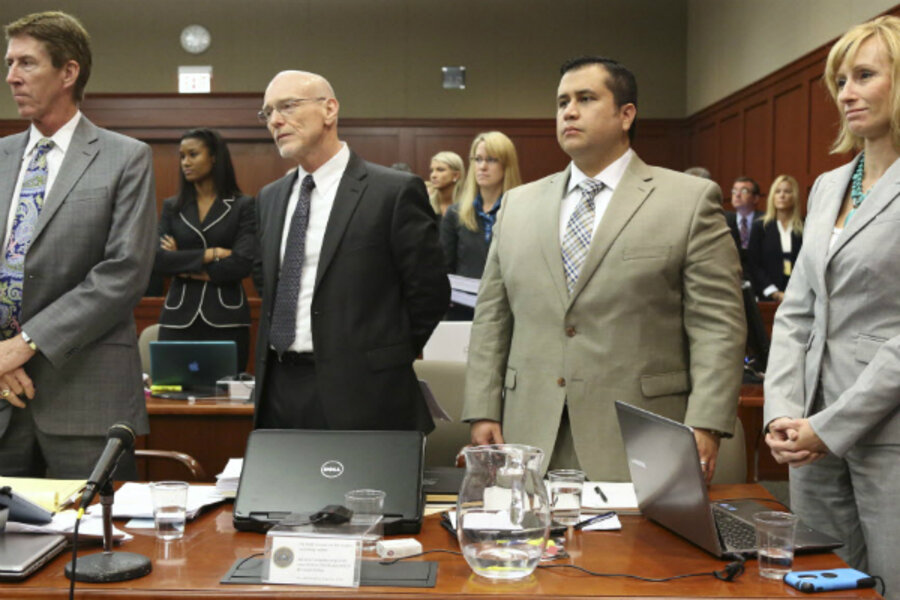George Zimmerman described black males as 'suspicious' in phone calls
Loading...
| Washington
Prosecutors in the second-degree murder trial of George Zimmerman argued Tuesday that the judge should allow the jury to hear about five phone calls Mr. Zimmerman made to police dispatchers in the six months before his fatal confrontation with teenager Trayvon Martin complaining about “suspicious” characters in the neighborhood.
Defense and prosecution arguments over the neighborhood watch phone calls took place before the all female jury was seated for the second day of testimony in the Sanford, Fla., trial. In each of the calls, Zimmerman described the suspicious characters as black males, the Associated Press reports. Trayvon is black. Judge Debra Nelson said she would rule after reviewing prior cases.
Tuesday’s events featured fewer fireworks than both sides’ opening arguments on Monday, which featured the prosecutor quoting profane statements Zimmerman made to a police dispatcher about Trayvon just before the shooting and a "knock knock" joke from a defense attorney that was poorly received by the jury.
Some of the most dramatic testimony of the day came from police Sgt. Anthony Raimondo, who was the second officer to respond to the scene of the shooting. Along with his partner, Sergeant Raimondo performed CPR on Trayvon, who was pronounced dead at the scene by emergency medical personnel. The jury heard Raimondo describe in graphic detail Trayvon's wounds and, for the first time, the prosecutor showed jurors several photos of the dead teenager lying in the grass.
The debate over the phone calls began late Monday when, according to CNN's live blog, the court adjourned after the prosecution introduced a nonemergency call made by Zimmerman in August 2011. He is heard reporting a suspicious person in the neighborhood.
Prosecutors said the call helps illuminate Zimmerman's state of mind the night Trayvon was killed, but the defense questioned the call's relevance. The judge asked attorneys on both sides to research the issue overnight and to argue their positions Tuesday morning.
In this morning’s arguments, prosecutors said calls made in the six months prior to the Feb. 26, 2012, incident in which Zimmerman shot an unarmed Trayvon show Zimmerman’s growing frustration with repeated break-ins in his gated community. It supports the prosecution theory that Zimmerman viewed Trayvon as a suspicious character and was “the straw that broke the camel’s back” as the Associated Press quoted prosecutor Richard Mantei as saying.
The calls that the prosecutors want the jury to hear are mentioned in a report from the Federal Bureau of Investigation, released by the state attorney’s office, which shows Zimmerman had a pattern of complaining frequently to authorities about events in his neighborhood.
Trayvon's family alleges that Zimmerman was profiling a black teenager as he followed him through the gated community where Zimmerman lived and where Martin was visiting the home of his father’s girlfriend. Zimmerman has entered a plea of not guilty, claiming he shot Trayvon in self-defense.
Defense attorney Mark O’Mara argued the previous calls were irrelevant and that the jury should focus on the seven or eight minute confrontation when Zimmerman shot Trayvon. “They are going to ask the jury to make a leap from a good, responsible citizen behavior to seething behavior,” Mr. O’Mara said.
The witnesses who testified Tuesday were all called by the prosecution. In addition to Raimondo, they included Wendy Dorival, who ran the Sanford Police Department’s neighborhood watch program. Zimmerman functioned as “neighborhood watch coordinator” of his gated subdivision. Ms. Dorival testified that neighborhood watchers are "the eyes and ears of law enforcement.” She added, “They are not supposed to take matters into their own hands.”
Also testifying was Donald O’Brien, president of the Homeowners Association at Twin Lakes, the subdivision where Zimmerman lived. “Everybody was supposed to watch out for their neighbors. If they see something suspicious, stay away and call the police," CNN quoted Mr. O’Brien as saying. The Grio’s live blog quoted Mr. O’Brien as saying he did not feel the neighborhood watch was necessary.
• Material from the Associated Press was used in this report.







